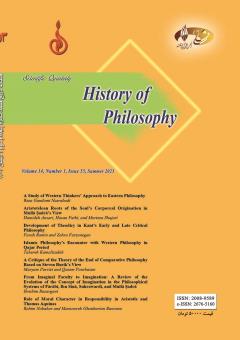Development of Theodicy in Kant’s Early and Late Critical Philosophy
Subject Areas : Geneology of philosophical schools and Ideas
Farah Ramin
1
*
![]() ,
Zahra Farzanegan
2
,
Zahra Farzanegan
2
![]()
1 - Professor at Islamic Philosophy and Kalam Department, University of Qom, Qom, Iran
2 - PhD in Islamic Philosophy and Kalam, University of Qom, Qom, Iran
Keywords: problem of evil, fundamental evil, radical evil, best order, theodicy, early critical period, late critical period, Kant,
Abstract :
Generally speaking, Kant’s academic life is divided into two pre-critical and post-critical periods. Some researchers have explored the historical development and evolution of his philosophical thoughts and divided the critical period into two parts as well. An explanation of Kant’s view of the problem of evil, given the difference in the subtle view that is witnessed in his works published in the early and late critical period, portrays the process of the formation of his philosophical structure in this regard. Related studies in this field reveal his gradual distance from the theoretical knowledge of God and, thus, his theological response to the problem of evil, which reached its culmination towards the end of the critical period. The principle of “freedom”, which is one of the postulates of ethics in Kant’s critical thoughts, is the axis of the justification of moral evil in his works, particularly during the later critical period. Following a descriptive-analytic method, the present study investigates Kant’s view of the problem of evil during two critical periods. In the early critical period, he confirmed the theory of the “best possible world”, while equating the concept of “perfection” with the concept of “reality” therein. However, in the late critical period, he moves away from the common definition of “evil and good” and presents a new response to the dilemma of evil through denying the legitimacy of philosophical theodicies. During the critical period, Kant viewed evil as an essential feature of Man and denied the traditional and Stoic interpretation of the temporal and rational origins of evil in human nature.
زوپانچیچ، آلنکا (1396) اخلاقیات امر واقعی: کانت، لاکان، ترجمه علی حسن¬زاده، تهران: آگاه.
کاپلستون، فردریک چارلز (1400) تاریخ فلسفه، ج1، ترجمه جلالالدین مجتبوی، تهران: علمی و فرهنگی.
کانت، ایمانوئل (1397) «درباب ناکامی تمام آزمونهای فلسفی در تئودیسه»، ترجمۀ سیدمحمدحسین صالحی، در دربارۀ شر، ج1، تهران: طه.
کانت، ایمانوئل (1399) درسهای فلسفه اخلاق، ترجمۀ منوچهر صانعی درهبیدی، تهران: نقش و نگار.
کانت، ایمانوئل (1394) دین در محدوده عقل تنها، ترجمۀ منوچهر صانعی درهبیدی، تهران: نقش و نگار.
کانت، ایمانوئل (1395) نقد عقل عملی، ترجمۀ انشاءالله رحمتی، تهران: سوفیا.
هوفه، اوتفرید (1392) قانون اخلاقی در درون من، ترجمۀ رضا مصیبی، تهران: نی.
Bernstein, R. J. (2007). Radical Evil. Cambridge: Polity press.
Huxford, G. (2020). Kant and theodicy. London: Lexington books.
Kant, I. (1978). Lectures on philosophical theology. New York: Cornell University press.
Kant, I. (1992). An attempt at some reflections on Optimism. Cambridge: Cambridge University Press.
Kant, I. (2001). Lectures on the philosophical doctrine of religion. Cambridge: Cambridge University Press.
Kant, I. (2007a). Conjectural beginning of human history. Cambridge: Cambridge University Press.
Kant, I. (2007b). Idea for a universal history with a cosmopolitan aim. Cambridge: Cambridge University Press.
Krishnan, M. (2021). Kant’s critical theory of the best possible world. Kantian Review, vol. 26, no. 1, pp. 27-51.
Leibniz, G. W. (2005). Theodicy. trans. by E. M. Huggard. Released online by the project Gutenberg [originally published in 1951 by Routledge & Kegan Paul Limited, London].
Louden, R. B. (2011). Kant’s human being. Oxford: Oxford University Press.

